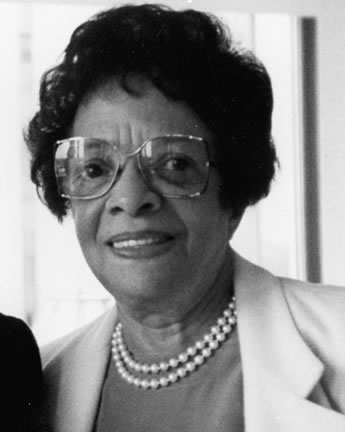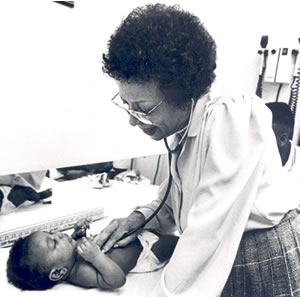 |
| “Nash cared for three generations of St. Louis children.” |
Helen Elizabeth Nash was born August 8, 1921, in Atlanta, Georgia, the third of six children. She attended Spelman College in Atlanta, earning a bachelor’s degree in 1942. She graduated from Meharry Medical College in 1945. She completed her residency, including chief residency, at Homer G. Phillips Hospital in St. Louis.
After residency training, Nash accepted a staff position at the same hospital. Each week Nash and her colleagues took the streetcar to St. Louis Children’s Hospital to attend Friday morning conferences. In 1949, she was the first African-American woman to join the attending staff at Children’s Hospital and become president of the hospital’s staff society in 1977. She was also the acting dean of minority affairs at Washington University School of Medicine for three years after her retirement from practice.
 |
| Nash with infant |
Helen Elizabeth Nash was a pioneer as an African-American woman training and starting a practice in the 1940s. She faced prejudice on two counts, but she never let that deter her from her goals. Her practice, opened in 1949 in St. Louis’ black business district, boomed from the start.
Some of the opposition she encountered was at home. He physician father didn’t think that Nash, at less than 100 pounds, had the physical stamina to withstand the rigors of attending medical school. Her maternal grandfather felt differently, and urged Nash’s mother to sell some real estate to finance her education. He mother did so, and soon Nash was an honor roll student at Meharry Medical College.
Nash is best known for her work as an advocate for children. By visiting “preemie” units in other hospitals around the country, she developed a designated ward for premature infants that was cleaner and included air conditioning and individual bassinets, and provided improved training for nursing staff.
Through her practice, Nash cared for three generations of St. Louis children by treating their physical illnesses in the wider context of their emotional, social and family situations. Instead of having to wait for “black days” – special days when white doctors would see black patients – sick black children could receive care from Nash at any time.
Today Nash is professor emerita (clinical) in pediatrics. She recently celebrated her 80th birthday.
